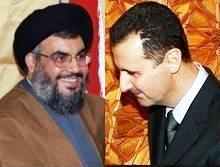 External pressure is building on President Bashar al-Assad. Along with the EU and US, key regional actors including Jordan, Saudi Arabia and Turkey have taken steps to distance themselves from the faltering Syrian regime. Further, as Meir Javedanfar argues on this site, the Iranian clerical leadership will only support Assad to the degree that this support serves their ongoing Islamic revolution.
External pressure is building on President Bashar al-Assad. Along with the EU and US, key regional actors including Jordan, Saudi Arabia and Turkey have taken steps to distance themselves from the faltering Syrian regime. Further, as Meir Javedanfar argues on this site, the Iranian clerical leadership will only support Assad to the degree that this support serves their ongoing Islamic revolution.
These states are calibrating their policies towards Syria with an eye on Assad’s potential fall from power and the consequences likely to follow. Hezbollah’s approach under leader Hassan Nasrallah is no different. As David Hirst notes, Nasrallah has made Hezbollah “the most influential political player in Lebanon and probably the most proficient guerrilla organisation in the world”. Nasrallah does not risk jeopardising these successes lightly.
Clearly, because of the major forms of support that Assad provides, Hezbollah has a vested interest in his political survival. This Syrian support includes the provision of material supplies and a relatively safe haven for Hezbollah leaders. Syria also acts as a reliable ally through which supplies of money and weapons can transit from Iran to Lebanon. And, as Randa Slim explains, Assad’s regime provides a legitimating and supportive Arab state to balance Iran. This complements Hezbollah’s intended appearance as a cross-sectarian liberation force, a force struggling not just for Shia Islam but for the subjugated “oppressed” in general.
However, as important as Assad’s support is to Hezbollah, the survival of his regime does not take precedence over Hezbollah’s objectives: the defeat of Israel, the marginalisation of American influence and the creation of a regional arc of Shia theocracies.
Accordingly, Hezbollah’s support for Assad is predicated on its perception of his political survival as both realistically possible and compatible with Hezbollah’s objectives. Hezbollah thus must consider the impact of its stance regarding Assad in the context of political environments in Syria, Lebanon and beyond.
Hezbollah knows that if Assad’s regime collapses, Syria will face a power struggle between factions of Alawites and Sunnis in which the outcome would be far from certain. As one example of potential situations that Hezbollah fears, the Sunni Muslim Brotherhood, long abused by the Assad dynasty in such acts as the massacre by Hafez-al Assad at Hama in 1982, would be highly reluctant to accept the continued Iranian patronage and guidance that characterises the current Assad-Iran relationship.
If Nasrallah believes it necessary, he will quietly move to put Hezbollah’s support behind a successor to Assad. This individual will be the person that Hezbollah believes can best provide relative continuity of the Assad-Hezbollah relationship and marginalise the risk of a Syrian civil war.
Hezbollah must also consider Lebanese political realities. In Lebanon, Hezbollah’s current power has been won by blending occasional acts of coercive force with a remarkable cross-sectarian alliance supported by Michel Aoun’s Free Patriotic Movement and once-fierce Shia rivals, Amal.
Through this strategy Nasrallah has successfully developed Hezbollah as a flexible and tenacious political force – an organisation whose leadership power in the coalition vis-a-vis both domestic and foreign policy is supplemented by Amal’s corrupt and increasingly ridiculed leadership and Aoun’s domestic focus.
At the centre of Hezbollah’s domestic power, though, is the popular perception of the organisation as the victor of the 2006 war with Israel. The translated political import of this belief has been dramatic. As the Palestinian commentator Tamim al-Barghouti explains, the war fuelled the notion of Nasrallah (and by association Hezbollah) as a “de facto caliph, a spiritual and political leader of Arabs and Muslims across national borders … [By] the ideology of resistance he symbolises, [Nasrallah] represents an all-powerful example to Arabs and Muslims who have been longing to regain some of the dignity they lost at the hands of their leaders.”
Through the war, Hezbollah has successfully cultivated the priceless self-image of a cross-sectarian defender, not just of poor Lebanese Shia (long loyal to the organisation for its generous welfare provision), but of Lebanese and regional citizens in general.
Nonetheless, Hezbollah is well aware that its base of domestic support must constantly be reinforced. Syrian gunboats shelling Palestinian refugee camps and images of Syrian troops shooting unarmed protesters obviously do not gel with Hezbollah’s carefully constructed organisational narrative – a notion centred on the organisation’s members as the heirs of the battle of Karbala, struggling against the odds for emancipation, empowerment and Islamic justice for all.
At their core, these realities mean that Hezbollah will not risk continued support for Assad if the price of that support is a substantial undercutting of the narrative upon which the organisation’s power resides.
While the brutality of the Iranian regime against its internal dissenters is supported by Hezbollah under the excuse of revolutionary necessity against “secular infiltration”, Assad’s situation is different. While Assad provides highly valuable support towards the pursuit of Hezbollah’s objectives, the survival of his regime is not in itself an imperative Hezbollah objective.
If Assad’s actions begin to affect Hezbollah in a powerful way, the organisation will abandon its useful but not existentially contingent ally. For Hezbollah, while allies and supply lines can be replaced, the organisation’s continued accumulation and preservation of power is crucial.

Leave a Reply
You must be logged in to post a comment.